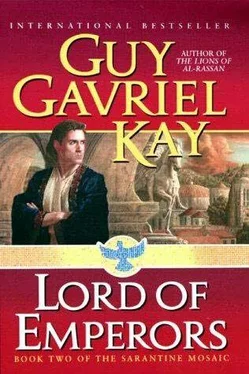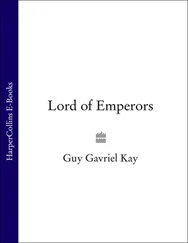Perhaps. Students, or potential students, could be unpredictable in various ways, and the income Rustem made from teaching was necessary for a man with two wives now and two children-especially with both women wanting another baby in the crowded house. Few of the villagers of Kerakek were able to pay proper physician's fees, and there was another practitioner-for whom Rustem had an only marginally disguised contempt-in the town to divide what meagre income was to be gleaned here. On the whole, it might be best not to disturb what seemed to be succeeding. If streaks of grey in his beard reassured even one or two possible pupils or military officials up in the castle (where they did tend to pay), then using the dye was worth it, he supposed.
Rustem looked out the window again. The sky was darker now beyond his small herb garden. If a real storm came, the distraction and loss of light would undermine his lessons and make afternoon surgery difficult. He cleared his throat. The four students, used to the routine, put down their writing implements and looked up. Rustem nodded and the one nearest the outer door crossed to open it and admit the first patient from the covered portico where they had been waiting.
He tended to treat patients in the morning and teach after the midday rest, but those villagers least able to pay would often consent to be seen by Rustem and his students together in the afternoons as part of the teaching process. Many were flattered by the attention, some made uncomfortable, but it was known in Kerakek that this was a way of gaining access to the young physician who had studied in the mystical east and returned with secrets of the hidden world.
The woman who entered now, standing hesitantly by the wall where Rustem hung his herbs and shelved the small pots and linen bags of medicines, had a cataract growth in her right eye. Rustem knew it; he had seen her before and made the assessment. He prepared in advance, and whenever the ailments of the villagers allowed, offered his students practical experience and observations to go with the treatises they memorized and copied. It was of little use, he was fond of saying, to learn what al-Hizari said about amputation if you didn't know how to use a saw.
He himself had spent six weeks with his eastern teacher on a failed Ispahani campaign against the insurgents on their north-eastern reaches. He had learned how to use a saw.
He had also seen enough of violent death and desperate, squalid pain that summer to decide to return home to his wife and the small child he had scarcely seen before leaving for the east. This house and garden at the edge of the village, and then another wife and a girl-child, had followed upon his return. The small boy he'd left behind was now seven years old and sitting on a mat outside the door of the medical chambers, listening to his father's lectures.
And Rustem the physician still dreamt in the blackness of some nights of a battlefield in the east, remembering himself cutting through the limbs of screaming men beneath the smoky, uncertain light of torches in wind as the sun went down on a massacre. He remembered black fountains of blood, being drenched, saturated in the hot gout and spray of it, clothing, face, hair, arms, chest… becoming a creature of dripping horror himself, hands so slippery he could scarcely grip his implements to saw and cut and cauterize, the wounded coming and coming to them endlessly, without surcease, even when night fell.
There were worse things than a village practice in Bassania, he had decided the next morning, and he had not wavered since, though ambition would sometimes rise up within him and speak otherwise, seductive and dangerous as a Kabadh courtesan. Rustem had spent much of his adult life trying to appear older than he was. He wasn't old, though. Not yet. Had wondered, more than once, in the twilight hours when such thoughts tended to arrive, what he would do if opportunity and risk came knocking.
Looking back, afterwards, he couldn't remember if there was a knock that day. The whirlwind speed of what ensued had been very great, and he might have missed it. It seemed to him, however, that the outside door had simply banged open, without warning, nearly striking the patient waiting by the wall, as booted soldiers came striding in, filling the quiet room to bursting with the chaos of the world.
Rustem knew one of them, the leader: he had been stationed in Kerakek a long time. The man's face was distorted now, eyes dilated, fevered-looking. His voice, when he spoke, rasped like a woodcutter's saw. He said, "You are to come! Immediately! To the fortress!"
"There has been an accident?" Rustem asked from his mat, keeping his own voice modulated, ignoring the peremptory tone of the man, trying to reestablish calm with his own tranquillity. This was part of a physician's training, and he wanted his students to see him doing it. Those coming to them were often agitated; a doctor could not be. He took note that the soldier had been facing east when he spoke his first words. A neutral omen. The man was of the warrior caste, of course, which would be either good or bad, depending on the caste of the afflicted person. The wind was north: not good, but no birds could be seen or heard through the window, which counterbalanced that, somewhat.
"An accident! Yes!" cried the soldier, no calm in him at all. "Come! It is the King of Kings! An arrow!"
Poise deserted Rustem like conscripted soldiers facing Sarantine cavalry. One of his students gasped in shock. The woman with the afflicted eye collapsed to the floor in an untidy, wailing heap. Rustem stood up quickly, trying to order his racing thoughts. Four men had entered. An unlucky number. The woman made five. Could she be counted, to adjust the omens?
Even as he swiftly calculated auspices, he strode to the large table by the door and snatched his small linen bag. He hurriedly placed several of his herbs and pots inside and took his leather case of surgical implements. Normally he would have sent a student or a servant ahead with the bag, to reassure those in the fortress and to avoid being seen rushing out-of-doors himself, but this was not a circumstance that allowed for ordinary conduct. It is the King of Kings!
Rustem became aware that his heart was pounding. He struggled to control his breathing. He felt giddy, light-headed. Afraid, in fact. For many reasons. It was important not to show this. Claiming his walking stick, he slowed deliberately and put a hat on his head. He turned to the soldier. Carefully facing north, he said, "I am ready. We can go."
The four soldiers rushed through the doorway ahead of him. Pausing, Rustem made an effort to preserve some order in the room he was leaving. Bharai, his best student, was looking at him.
"You may practice with the surgical tools on vegetables, and then on pieces of wood, using the probes," Rustem said. "Take turns evaluating each other. Send the patients home. Close the shutters if the wind rises. You have permission to build up the fire and use oil for sufficient light."
"Master," said Bharai, bowing.
Rustem followed the soldiers out the door.
He paused in the garden and, facing north again, feet together, he plucked three shoots of bamboo. He might need them for probes. The soldiers were waiting impatiently in the roadway, agitated and terrified. The air pulsed with anxiety. Rustem straightened, murmured his prayer to Perun and the Lady and turned to follow them. As he did, he observed Katyun and Jarita at the front door of the house. There was fear in their eyes: Jarita's were enormous, even seen at a distance. She stared at him silently, leaning against Katyun for support, holding the baby. One of the soldiers must have told the women what was happening.
He gave them both a reassuring nod and saw Katyun nod calmly back as she put her arm around Jarita's shoulders. They would be all right. If he came back.
Читать дальше
Конец ознакомительного отрывка
Купить книгу










